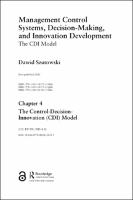Chapter 4 The Control-Decision- Innovation (CDI) Model
Proposal review
Abstract
Chapter 4 is designed so as to consolidate the discussion presented in Chapters 1–3. It introduces the control-decision-innovation (CDI) model and thus concludes the process of its gradual development. The foundation of the model is derived from the complex, and therefore challenging, nature of innovation system management and control. Consequently, it demonstrates that a direct link between management control systems and decision-making quality exists, but differs in terms of the specific tools and control types implemented within the organisation. In addition to that, the model indirectly links MCSs to decision-making quality via the transactive memory system to account for the cognitive interdependence of specialists equipped with expert knowledge. This path is obligatory, as expert knowledge is nothing less than crucial in innovation development. Next, the model specifies that the efficiency of an innovation development system results from the sum of the quality of all decisions made within all the functional areas involved. In other words, the logic behind the CDI model is that mechanistic and organic management control systems have direct and indirect positive effects on decision-making efficiency and decision effectiveness, which in turn have a direct positive effect on the composite innovation index.
Keywords
Management Control Systems, Decision-Making, Innovation Development, CDI model, transactive memory system, decision effectivenessDOI
10.4324/9781003215035-5ISBN
9781032103723, 9781032103754, 9781003215035Publisher
Taylor & FrancisPublisher website
https://taylorandfrancis.com/Publication date and place
2021Imprint
RoutledgeClassification
Management and management techniques
Research and development management
Business strategy


 Download
Download